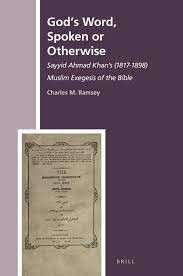Ramsey (Charles M.), God’s Word, Spoken or Otherwise. Sayyid Ahmad Khan’s (1817-1898) Muslim Exegesis of the Bible, Leiden, Brill, ("The History of Christian-Muslim Relations, Volume: 45"), 2022. ISBN 978-90-04-47240-2
Author
Charles M. Ramsey, Ph.D. (2015), University of Birmingham, is Fellow, Institute for Studies of Religion at Baylor University (USA) where he teaches courses in Islamic Studies and the History of South Asia. He has published many writings on Islam in South Asia, including South Asian Sufis (Continuum, 2012) and The Gospel According to Sayyid Ahmad Khan (Brill, 2020).
Presentation

Set in British India soon after the Uprising of 1857, God’s Word, Spoken and Otherwise explores the controversial and ingenious ideas of one of South Asia’s most influential public thinkers, Sir Sayyid Ahmad Khan (1817-1898). Bringing to light previously unpublished material from his exegetical commentaries on the Bible and Qur’an, this study explores the interplay of natural and prophetic revelation from an intertextual perspective. The book provides fresh insight into Sir Sayyid’s life and work, and underscores both the originality of his ideas, and also their continuity within a dynamic Muslim intellectual tradition.
Contents
Table of contents
Preface
Notes on Translation and Transliteration
Abbreviations
1 Introduction
1 Approaching the Texts
2 Approaching the Context
3 Studies on Sayyid Ahmad Khan
4 Outline of the Chapters
2 The Tabyīn in Context
1 The Political Setting
2 The Intellectual Environment
3 Revelation Recorded
4 The British Intellectual Environment
5 Sayyid Ahmad’s Life and Works
6 Conclusion
3 On the Bible
1 What Is the Significance of the Title Tabyīn al-kalām?
2 How Did Sayyid Ahmad Present His Commentaries on the Bible?
3 Rationale for a Muslim Reading of the Bible
4 Taḥrīf: The Greatest Obstacle to the Tabyīn Project
5 Nāsikh wa-mansūkh
6 Tabyīn Part 2
7 To Reconcile Scripture and Science
8 The Garden: What Did Transpire?
9 Conclusion to Genesis
10 Tabyīn Part 3
11 The Person of Jesus Christ
12 The Words and the Text
13 The Counsels of Jesus
14 Tafsīr al-Qurʾān
15 Jesus’s Miraculous Birth
16 Jesus Speaks in Infancy
17 Jesus Raises the Dead
18 Jesus’s Heavenly Ascension
19 Conclusion
4 Prophecy: Rehearsed and Unrehearsed
1 To Know What One Knows
2 Experience as the Basis of Knowledge
3 Experiment as the Way to Knowledge
4 Knowledge for Salvation
5 The Prophetic Experience
6 Differentiating the Rehearsed and the Unrehearsed
7 The Inimitable Qurʾan
8 The Qurʾan as Text
9 Revelation Defined
10 Sources for the Adoption of the Taxonomy
11 Construction Applied to the Bible
12 Revelation Recorded
13 Revelation in the Bible
14 The New Testament Authors
15 Writings Other Than Gospels in the New Testament
16 Conclusion
5 The Coherence of Revelation
1 Introduction
2 Continuity and Originality
3 Scripturalist falsafa
4 Conclusion
6 Conclusion
1 How Did Sayyid Ahmad Conceptualize Prophetic Revelation in the Bible?
2 What Did Sayyid Ahmad Understand Himself to Be Doing in Tabyīn?
References
Index
